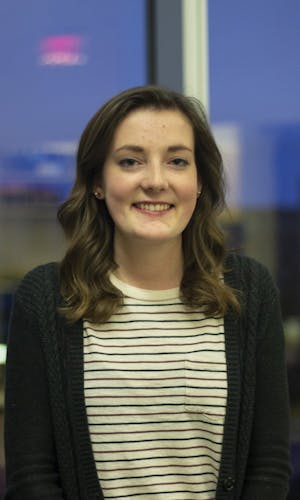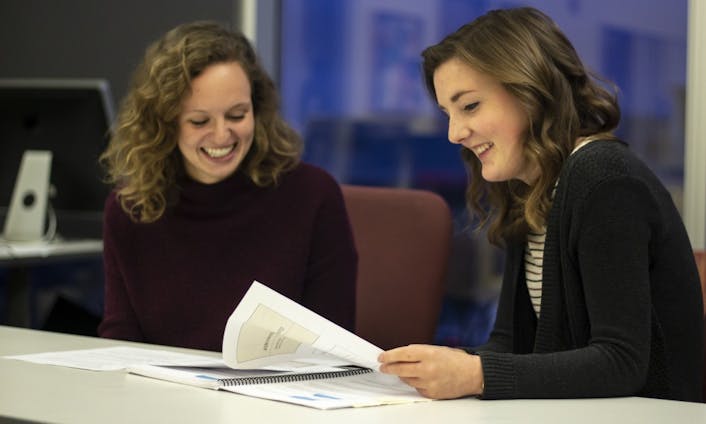When Laura Downer and Morgan Grunow ran for positions leading the 26th session of Associated Students of Madison, becoming another all-female leadership team — the first since the 23rd session — wasn’t at the forefront of their minds.
ASM elected Downer and Grunow to serve as chair and vice chair, respectively, last spring. Now they lead the current session of student council, something two women haven’t done since the 2016-’17 academic year.
However, this wasn’t on either of their lists of reasons for running, according to Downer.
“It didn't play into why I was running for this position and why Morgan was running for it; it was definitely just [that] we happened to be the people who were qualified for the positions and wanted to run for them and ultimately were elected by student council,” Downer said. “So it wasn't a big push to have two women in power again, but I'm glad it worked out this way.”
Historically, two female student government leaders at UW-Madison hasn’t been particularly common. Four years ago, Madison Laning and Vanessa Studer headed the 22nd session of ASM, and the year after that — when Downer and Grunow were freshmen — Carmen Goséy and Mariam Coker led the 23rd session.
“That was empowering to me as a freshman, to just look and see who was running the organization and just see them in positions of power,” Downer said.
This is Grunow and Downer’s second year working together, Grunow said. Last year, they each held leadership positions — Downer as legislative affairs chair and Grunow as press office director — and collaborated on some of ASM’s campaign-based work.
A copy of an op-ed they worked on together last fall hangs in their shared office. Tacked up on a desk is a list of both Grunow and Downer’s individual strengths from an exercise done at an ASM retreat.
Downer noted that their different strengths are “crucial” to their teamwork.
“We collaborate on everything we do, and I think we have differing strengths and they balance each other. They play off each other well,” she said. “She's far more about relationship-building and communication, and I'm much more executing and strategic thinking, so between the two of us, we come up with effective strategies and good policy, hopefully.”
After two years of working together, Grunow said they’ve established a positive working dynamic.
“It's always hard to work in a college-student setting, and it can create different barriers,” Grunow said. “This is my second year working with Laura, so it's been going really well. We've developed good communication mechanisms for how we want to communicate with each other without being too stressful.”
“An active role”
Both are seniors — Downer is studying international studies, German and political science with a certificate in European studies, while Grunow is studying journalism with a certificate in environmental studies. Downer is also working toward her accelerated master of international public affairs degree with the La Follette School.
After graduation, Grunow is looking to find a career in either environmental reporting or communications, moving away from government work. Downer, on the other hand, plans to continue her work in policy, ideally in international relations.

Downer comes from a military family, so she was born in Arkansas but attended high school in Pennsylvania. UW-Madison’s opportunities to study abroad in Germany drew her to apply, since Downer intended on pursuing German as her major originally.
She discovered ASM as a freshman on the first night of the student organizations fair. Without any previous student government experience, she joined the legislative affairs committee with a friend.
Downer became an ASM intern that spring, which was also when former Gov. Scott Walker’s budget proposal included a provision to allow students to opt-out of segregated fee payments. Segregated fees fund aspects of campus life such as the bus pass and registered student organizations, and allowing students to opt-out could leave many of these programs underfunded.
The segregated fee opt-out gave Downer an opportunity to try her hand at lobbying.
“I just thought it was so exciting to have actual opportunities to go down to the Capitol and talk to legislators and talk to real decision-makers about things that were impacting the university and students directly,” she said. “So then I became really interested in segregated fees and how that whole process worked.”
Downer spent her sophomore year abroad in Freiberg, Germany, which she said gave her an outsider’s perspective of ASM. When she took the next step in her work with policy by running for legislative affairs chair, she Skyped into her own election at around 1 a.m. local time.
But for Downer, it was worth it.
“[The election] was a whole ordeal. But I was really passionate about it, and I knew I really wanted to keep doing work,” she said. “A budget year was coming up again last year, and I had big ideas and I was looking to breathe some life back into the committee and rally it around student state budget priorities.”
Through her work as legislative affairs chair, Downer learned more about the inner workings of ASM and saw opportunities “to create a more cohesive, collaborative and responsible organization” that she could tackle as chair of the whole organization.
She also didn’t want ASM to lose the momentum of last year’s external campaigns, particularly mental health. As a result of the organization’s work, University Health Services hired 13 new mental health counselors and extended hours on Mondays and Tuesdays, Downer said.
“The way that ASM went about that campaign is the most effective I've ever seen ASM operate,” she said. “It was a thing that worked, and we're seeing the results of it.”

Grunow is from Lake Geneva, Wisconsin, putting UW-Madison at a distance that isn’t too far from home but isn’t right down the street either. The university had a variety of highly rated programs, so it made sense for Grunow to select it as a high schooler, when she was unsure what she’d eventually study.
Her involvement with ASM began with a class — Journalism 201. ASM’s press office board sent an email about how to get involved with communication work to Grunow’s professor, who then shared it with the class. Grunow attended a meeting, and she became assistant press office director the next year.
After moving up to press office director the following year, she wanted to stay both external outreach and everything going on internally.
“I really liked my role in press office as being overarching messaging for ASM and being involved in kind of a little bit of everything, and also taking an active role in campus relations committee and outreach in that sense,” Grunow said. “[I] saw the vice chair role as kind of a natural next step.”
“An official student voice”
Grunow and Downer’s positions serve as a formal representation of students to university administration, UW-Madison’s version of a “student body president” and “student body vice president,” according to Downer.
“That entails keeping a pulse on what students are feeling and what issues are most salient, and it means gathering that information and figuring out what that looks it in terms of actual university policy change, because not every student has the time to dig into university policy,” Downer said. “It means being a voice for students when things happen on campus and providing an official student voice.”
On a more tangible level, they both work with other student leaders on ASM, meet with administrators, set priorities and goals for the session, lead subcommittees, create the ASM internal budget of about $1.3 million and work on any internal reform such as bylaw changes. Downer also chairs student council meetings while Grunow leads coordinating council meetings.
Their daily schedules are packed with meetings, check-ins and time spent reviewing material. A glance at Downer’s Google calendar reveals many overlapping boxes crowding each day. She eagerly pointed out the one event that wasn’t ASM-related: a German club kickoff meeting.
Downer clocks 25 hours of work per week, but sometimes she’ll put in up to 30. Official policy doesn’t let students work more than 29 hours, so her extra time goes unrecorded.
However, she does find many parts of the job rewarding.
“My favorite part about it is getting to work on campaigns from a holistic perspective and getting to do the coordination piece of it. It's like a puzzle, to me, to figure out ‘Okay, well who are these people in Bascom that we should be talking to, and who are the student leaders that we should be talking to, and how does that relate to what people we have in ASM and what their positions are and the work that they're doing?’” she said.
Grunow’s favorite part of her job is observing her fellow student leaders thrive in their roles, especially when they collaborate with each other, something that took prompting in the beginning.
“I've really liked to see how different leaders have become more comfortable [with] their roles,” she said. “That's super encouraging to ASM as an organization, and just seeing them feel more confident, whether it's leading a meeting or talking with different committee members or even just speaking up at student council or coordinating council meetings has been great.”
The positions also came with new challenges, too, including communication and student council meetings. Downer attributes some of the tedium of the meetings to everyone in student government’s “strong opinions” and her new position as a neutral party — not voting unless there’s a tie.
“It's a learning process for me, and do think part of that is that is I miss debating things myself,” Downer said. “Having to just sit back and watch other people debate — it makes me miss it, it makes me miss participating in that sense more.”

Downer also said that as much as she doesn’t like looking at her job through a gendered lens, she can’t deny that certain pressures exist.
“Sometimes being a woman in leadership, there are certain expectations that you have to be nice all of the time, or you have to be amicable, or that your feelings come first, ahead of the numbers, which is not how I operate,” Downer said.
These concerns caused Downer to reflect on her own leadership style and how others perceive it based on her gender, an “introspective journey” she also encountered as legislative affairs chair.
“The other part of it is that I'm just a very small woman, too, and so sometimes walking into legislators' offices or administrators' offices, I become very aware of how small I am,” she said. “I have to remind myself, ‘No, I have this position for a reason. I have students that I am here to advocate for. I have a job to do and I'm going to do it.’”
However, she also said campus has lots of examples of women in leadership who could be role models, from other ASM leaders to UW-Madison’s chancellor, vice chancellor for student affairs and dean of students.
And for Grunow, many experiences have been the same as when two men led ASM last year, leading to a positive launch for the 2019-’20 session.
“It's been a good start to the session, just being able to work with different leaders stepping into roles, and I'm excited to see how that changes over the semester and over the rest of the year,” Grunow said.






